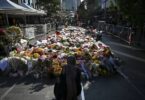Ulrich Eberle / Ashish Pradhan / Richard Gowan
What are Security Council members negotiating about?
UN Security Council members are discussing a draft resolution on climate security tabled by Ireland and Niger at the end of September. If it passes, it will be the first resolution of its kind, although the Council has held sessions on climate change and its implications for peace and security since 2007. These discussions, which were sporadic at first, have become much more frequent in the last five years. But aside from one statement (which lacks the stature of a resolution) in 2011, the Council has never formally put its concerns about climate change on paper.
The resolution’s goal is, in essence, to create a baseline for systematic discussions of how the impact of climate change – manifested in droughts, sea-level rises, floods and other extreme weather events – is shaping peace and conflict worldwide. The linkage between these factors and instability is increasingly clear in many areas where the UN operates. In the Sahel, land degradation associated with climate change has sparked violence between farmers and herders. In South Sudan, where UN peacekeepers are tasked with protecting civilians, three consecutive years of historic flooding have exacerbated widespread food and economic insecurity, displacing over half a million people, driving pastoralists south and fuelling conflict in the Equatoria region.
While the Security Council has recognised these problems in certain cases, it does not have standard procedures for predicting, assessing and responding to such climate-related risks.
The draft text calls on Secretary-General António Guterres to deliver a big report on climate security within two years, which would include general recommendations for how to tackle climate-related security risks. The draft also asks UN field missions to report more often on climate-linked concerns and encourages the UN to deploy experts on the topic in its operations. Finally, it invites Guterres to consider appointing a special envoy for climate security, although some Council members worry that there are already a number of UN envoys dealing with aspects of climate change, and that adding another official to the mix risks duplication.
The resolution would ensure that the Council discusses climate security on a regular basis in the future.
The resolution would also ensure that the Council discusses climate security on a regular basis in the future, just as it talks about established thematic priorities such as the Women, Peace and Security agenda. To date, it has been up to individual Council members to initiate talks on climate security, which has meant that discussions have ebbed and flowed unpredictably.
What does the resolution not cover?
While looking at the links between climate and conflict, the draft resolution does not go as far as some climate campaigners would like. It does not imply that the Council has any role in shaping broader UN discussions of global warming, such as those coming up at the Glasgow Conference of the Parties to the UN Framework Convention on Climate Change (or COP26) in November. The Security Council draft instead has a narrow focus on encouraging a greater understanding of how climate change affects the Council’s existing peace and security concerns and UN missions.
How has the Council addressed climate security concerns until now?
The Council has focused on climate security in an ad hoc fashion. It has tended to emphasise the issue in dealing with parts of Africa – notably the Sahel and Lake Chad basin – while treating it as a lower priority elsewhere. In the absence of an overarching Council strategy on climate change, members who worry about the issue – often European, African and Latin American governments – have succeeded in inserting references to the topic in the mandates of specific UN peace operations and political offices. These have typically encouraged the UN missions to assess climate-related risks in their areas of operation and support national authorities’ efforts to develop risk management strategies in response.
The UN system’s capacity to respond to such requests has been limited but is improving. In 2018, Sweden (then a member of the Security Council) provided funding for a new Climate Security Mechanism – a team of staff spread across the UN Department of Political and Peacebuilding Affairs, UN Development Programme and UN Environment Programme – to generate better risk analyses. The UN has also deployed a climate security adviser to its mission in Somalia to analyse climate-related risks and coordinate UN agencies’ responses, and Council members have discussed sending similar officials to the South Sudan operation.
In 2020, Germany, which championed climate issues during its 2019-2020 term on the Council, partnered with Niger to initiate a new Informal Expert Group on Climate and Security (IEG) to act as a forum for detailed discussions of these matters among members. This mechanism lacks formal status at the Council, and Russia has refused to participate even as an observer in 2021 – a posture that reflects Moscow’s broader doubts about the climate security agenda. Still, despite its limitations, the IEG has already discussed the Sahel, Somalia and South Sudan.
Neither the Security Council nor the UN as a whole has yet fully come to grips with many of the implications of climate change.
Against this backdrop, neither the Security Council nor the UN as a whole has yet fully come to grips with many of the implications of climate change. The different parts of the UN system working on climate issues and conflict are far from well integrated. They still do not regularly fuse climate-related information – such as satellite data – with the UN’s political analyses of tensions in affected countries. The Council also does not make systematic connections between parallel discussions of climate change and related phenomena, such as food shortages, in vulnerable regions. The proposed new resolution could create a platform for the secretary-general and UN officials to present the Council with better-integrated analyses and warnings on climate security as it relates to international peace and security.
How have negotiations on the draft resolution gone so far?
The Security Council’s discussions of a climate security resolution are a sequel to a major push by Germany to secure a similar text in 2020. In the first half of that year, Germany convened nine other sympathetic members of the Council to develop a draft resolution. But German diplomats recognised from an early stage that they were unlikely to get the text past opposition from China, Russia and – decisively from Berlin’s perspective – the United States, which under the Trump administration was profoundly suspicious of UN action on climate change. U.S. officials made it clear that they would veto the German-led draft, and Berlin settled for holding a high-level Council meeting on the topic in July 2020 and launching the IEG.
Council members recognised that the January 2021 change of administration in Washington opened up new possibilities. In February, the UK hosted a virtual Council meeting on climate security involving Prime Minister Boris Johnson, other heads of state and government, U.S. Climate Change Envoy John Kerry and natural historian David Attenborough. Most participants signaled support for renewed UN action in this area.
In the months that followed, Ireland and Niger (the current IEG chairs) – with help from Norway and Kenya – led talks on a new draft resolution drawing on the draft German text from 2020. The talks involved twelve of the fifteen current Council members. The three absentees were China, Russia and India. Ireland organised another Council meeting on climate security during the high-level session of the General Assembly in late September, before tabling its text with Niger on 30 September. A group of Council experts held a full read-through of the draft in the second week of October.
There is now a pause while officials in New York discuss the text with their capitals and engage in bilateral talks on the draft. The process is likely to accelerate in the run-up to December, when Niger holds the rotating Security Council presidency during the last month of its term as an elected member. The resolution’s supporters hope to get it across the line before new members – including a notably sceptical Brazil – enter the Council in January 2022, requiring a new set of negotiations. But India, China and Russia have made it clear that they have serious reservations about the text, as discussed further below.
Who are the main champions of the resolution?
While four fifths of Council members back the draft text, the three African members of the Council (Kenya, Niger and Tunisia) have taken an especially prominent role in advocating for a resolution.
Given the Council’s focus on climate security in Africa to date, the group’s stance is important and undercuts claims that Western members of the Council drive this agenda. During Germany’s previous push for a resolution, South Africa (a member in 2019-2020) was sceptical, apparently worried that the Council could eventually try to legislate on environmental issues beyond Pretoria’s view of its remit. Kenya, which took South Africa’s seat in 2021, has by contrast emphasised its concerns about climate-related risks in the Horn of Africa. Niger has similarly flagged the impact of climate change in its neighbourhood. Most Council members respect the Nigerien mission’s focus on the issue and would like to see the resolution pass during its presidency in December.
The U.S. has signalled its approval of the initiative but has taken a low profile … to avoid the issue becoming entangled in its disputes with China and Russia.
The U.S. has signalled its approval of the initiative but has taken a relatively low profile in Council discussions to avoid the issue becoming entangled in its disputes with China and Russia. Despite chairing February’s debate on climate security, the UK has been more focused on the forthcoming Glasgow summit, and happy to let Ireland and Norway work with Niger and Kenya on the draft resolution. France, which floated ideas for a UN General Assembly resolution on climate security while the Trump administration was working to block Security Council action, is also supportive.
Does the resolution have any direct link to the Glasgow Climate Change Conference?
No. Security Council diplomats, including the British, have been keen to keep the two things apart. While COP26 is generally agreed to be a crucial follow-up to the 2015 Paris Climate Change Conference, it is still not clear if participants will make serious progress toward limiting global warming. Council diplomats want to avoid any setback in Glasgow dampening enthusiasm for the proposed resolution. Conversely, they also want to avoid any arguments over the resolution unintentionally complicating wider negotiations at COP26.
Why are China, India and Russia sceptical of the Security Council resolution, and can they be persuaded to back it?
While the bulk of Council members want a climate security resolution, China and Russia retain the power to veto it. Although India cannot block the text by itself, its doubts about the initiative do have an impact on how the resolution is perceived, given its status as the largest economy among the elected Council members. All three have expressed similar concerns about the Security Council engaging on climate change. First, they warn that the Council risks trespassing into areas of global cooperation that fall under the purview of other UN decision-making forums and processes. Secondly, they question whether there are robust methodologies for assessing climate-related conflict risks.
It is still not clear that [China and Russia] will assent to a more systematic resolution on climate security.
Chinese and Russian officials have indicated some willingness to engage more on country-specific climate-related risks, and as noted above have acquiesced in the references to these risks in some UN mission mandates. But it is still not clear that they will assent to a more systematic resolution on climate security. Russia in particular opposes efforts to expand the Council’s definition of peace and security. Other Council members recognise that if Beijing or Moscow remains opposed to the initiative in principle it will be almost impossible to sway them by offering concessions on specific ideas in the text. By contrast, if they do decide to engage on the text in more detail, they will likely want to narrow its terms. Ideas such as the invitation to appoint a special envoy for climate security could be traded away.
There are still some reasons to think that Beijing and Moscow could let the resolution pass, even if by abstaining on it rather than supporting it outright. China has presented itself as a leader on climate change at the UN. President Xi Jinping promised to stop Chinese funding for coal-fired power beyond its borders at the General Assembly, for example. Torpedoing a relatively modest resolution of this kind would dent China’s claim to leadership in this field, particularly when coupled with news that Xi is unlikely to travel to Glasgow, and that China will continue to build coal-fired plants at home. Council members also say that China’s criticisms of the draft are generally more nuanced than the Indian and Russian positions, which some read as hinting at a readiness to compromise.
Russia is as a rule more willing to cast its veto than China, but it has not previously done so on a “thematic” resolution – ie, one addressing a global challenge as opposed to country-specific texts on conflict situations like Syria and Ukraine. Moscow may conclude that, if Beijing is willing to let the resolution through, it may as well do so, too. In that case, India could either vote against the resolution on principle, but with no effect, or also abstain. There is thus a pathway to a resolution, although it requires China and Russia in particular to shift their positions considerably in the coming months.
Another possibility is that the resolution’s opponents could run out the clock on negotiations in December, either by refusing to negotiate or dragging out text-based talks. That would force the draft’s supporters to start rebuilding consensus on the text with new Council members in January 2022, although the German and Irish-Nigerien drafts at least provide a solid basis for further talks.
In order to have a chance at getting the job done, the Council members that support the resolution (and friends outside the Council like Germany that carry some weight with Beijing and Moscow) need to persuade the doubters that it is not worth incurring the reputational damage of blocking the text. They should all do what they can to secure a successful vote before the end of this term. At the end of the day, adopting a climate security resolution would be a small step toward clarifying the Council’s understanding of the consequences of climate change for international peace and security. But the UN has a lot of catching up to do on climate security, and the resolution under discussion would help it move in the right direction.
Courtesy: (Crisisgroup)






